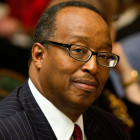
Advocates Cheer Listenbee as New Federal Head of Juvenile Justice
|
Juvenile justice advocates hailed the Obama administration’s announcement Friday that Philadelphia defense attorney Robert Listenbee Jr., a long-time champion of limiting the detention and incarceration of juveniles and keeping them out of adult facilities, will be the next permanent administrator of the federal Office of Juvenile Justice and Delinquency Prevention. Listenbee is the head of the Juvenile Unit at the Defender Association of Philadelphia, a member of the federal advisory council on juvenile justice, and a co-chair of a national blue-ribbon taskforce that recently explored the extent of American children’s exposure to violence. In 2011, the MacArthur Foundation’s Models for Change initiative honored Listenbee with a Champion for Change award for his leadership in reforming the juvenile justice system in Pennsylvania. Listenbee has a bachelor’s degree from Harvard University and a law degree from the University of California at Berkeley. Several juvenile justice professionals, including those who have worked with Listenbee at the local, state and national level, expressed great pleasure at his selection.










